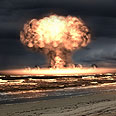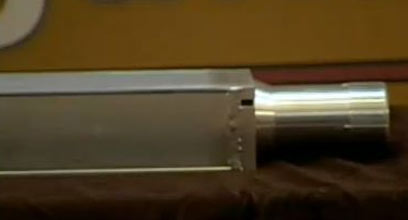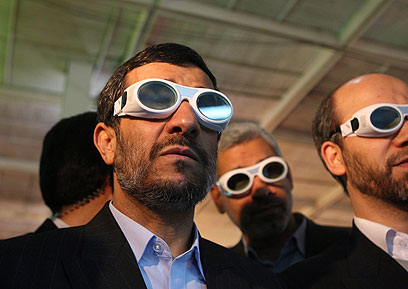
(Illustration)
צילום: shutterstock
ISIS: Iran has enough uranium for 5 bombs
New report by Institute for Science and International Security suggests Tehran has been able to stash enough enriched uranium in recent years to produce multiple nukes
Iran has significantly stepped up its output of low-enriched uranium and its total production in the last five years would be enough for at least five nuclear weapons if refined much further, a US security institute said.
The Institute for Science and International Security (ISIS), a think-tank which closely tracks Iran's nuclear program, made the analysis on the basis of data in the latest quarterly UN watchdog report which was issued on Friday.
Related stories:
- ISIS: Iran won't pursue nuclear weapon in 2012 ISIS: Iran concealed key atom research center ISIS links Iranian FM to past nuclear program
Progress in Iran's nuclear activities is closely watched by the West and Israel as it could determine how long it could take Tehran to build atomic bombs, if it decided to do so. Iran denies any plan to and says its aims are entirely peaceful.
During talks in Baghdad this week, six world powers failed to convince Iran to scale back its uranium enrichment program.

Fuel rod used in Iran's centrifuges (Screenshot)
They will meet again in Moscow in mid-June to try to defuse a decade-old standoff that has raised fears of a new war in the Middle East that could disrupt oil supplies.
Iran still defiant
Friday's report by the International Atomic Energy Agency (IAEA), a Vienna-based UN body, showed Iran pressing ahead with its uranium enrichment work in defiance of UN resolutions calling on it to suspend the activity.
It said Iran had produced almost 6.2 tons of uranium enriched to a level of 3.5% since it began the work in 2007 – some of which has subsequently been further processed into higher-grade material.
This is nearly 750kg more than in the previous IAEA report issued in February, and ISIS said Iran's monthly production had risen by roughly a third.

(Photo: Reuters)
"This total amount of 3.5% low enriched uranium hexafluoride, if further enriched to weapon grade, is enough to make over five nuclear weapons," ISIS said in its analysis.
It added, however, that some of Iran's higher-grade uranium had been converted into reactor fuel and would not be available for nuclear weapons, at least not quickly.
Enriched uranium can be used to fuel power plants, which are Iran's stated purpose, or to provide material for bombs, if refined to a much higher degree. The West suspects that may be Iran's ultimate goal despite the Islamic Republic's denials.
Iran began enriching uranium to a fissile concentration of 20 percent in 2010, saying it needed this to fuel a medical research reactor. It later expanded the work sharply by launching enrichment at an underground site, Fordow.
It alarmed a suspicious West since such enhanced enrichment accomplishes much of the technical leap towards 9% – or weapons-grade – uranium.
The IAEA report said Iran had installed more than 50 percent more enrichment centrifuges at Fordow, which is buried deep under rock and soil to protect it against any enemy attacks.
Although not yet being fed with uranium, the new machines could be used to further boost Iran's output of uranium enriched to 20%.
ISIS said Iran still appeared to be experiencing problems in its testing of production-scale units of more advanced centrifuges that would allow it to refine uranium faster, even though it had made some progress.
- Receive Ynetnews updates directly to your desktop










